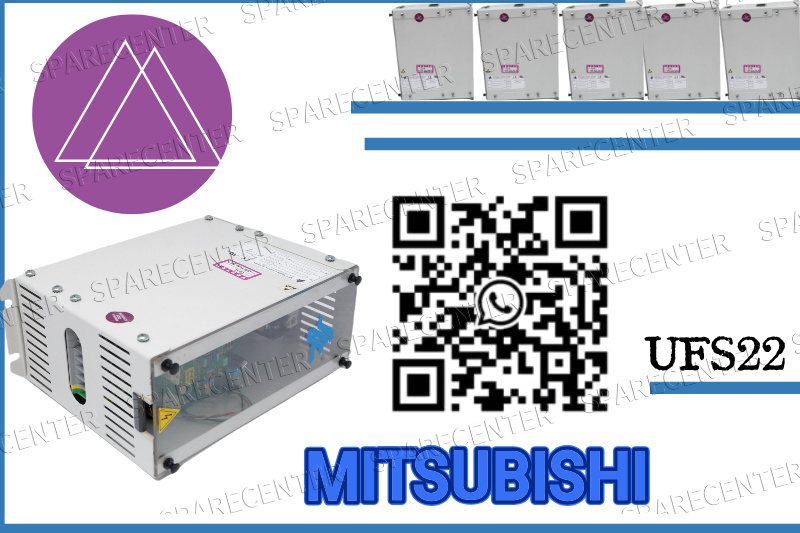| Introduction The MITSUBISHI UFS22, likely a specialized control module or interface within Mitsubishi's extensive automation portfolio, exemplifies this enduring engineering. Though it might be considered part of legacy systems today, its contribution to the principles of efficiency and reliability in machine operation remains significant, particularly for industries in bustling industrial hubs like Singapore. Understanding the MITSUBISHI UFS22's role offers insights into robust and dependable industrial processes. The MITSUBISHI UFS22: Bridging Control and Performance for Efficiency Firstly, a primary role of the MITSUBISHI UFS22 would involve sophisticated signal processing and accurate data conversion. In the intricate setups of industrial automation, various types of signals—be they analog, digital, or pulse—demand precise processing and transformation into formats comprehensible by the central control unit. The MITSUBISHI UFS22 would expertly manage this crucial signal processing, guaranteeing that data from sensors or control commands from the PLC are accurately transmitted and interpreted. Secondly, the MITSUBISHI UFS22 is instrumental in comprehensive system integration and robust communication. In a diverse manufacturing environment, equipment from various vendors or different generations often needs to communicate flawlessly. If the MITSUBISHI UFS22 serves as a communication interface, it is responsible for protocol translation, enabling disparate parts of a complex system to "speak" to each other. Such seamless system integration is paramount for centralized monitoring, accurate data logging, and swift troubleshooting, thereby significantly enhancing overall operational transparency and efficiency. This continuous system integration via the MITSUBISHI UFS22 directly supports reliability. Finally, the inherent design of components like the MITSUBISHI UFS22 steadfastly prioritizes reliability and industrial robustness. Environments in industrial automation are frequently harsh, characterized by electrical noise, temperature fluctuations, and vibrations. The MITSUBISHI UFS22 would have been meticulously engineered to withstand these demanding conditions,The unwavering reliability delivered by the MITSUBISHI UFS22 directly underpins overall system efficiency. |
Despite the relentless march of technological advancement, numerous industrial automation facilities globally, including a significant number in Singapore, continue to rely heavily on legacy systems. The MITSUBISHI UFS22, as an indispensable part of such installations, maintains considerable relevance for several compelling reasons. Its continued operation enhances overall efficiency and reliability.
Firstly, the sustained operation of the MITSUBISHI UFS22 directly contributes to the cost-effectiveness of existing infrastructure. Replacing an entire industrial automation control system can be an exceptionally expensive and profoundly disruptive undertaking. By ensuring the longevity and continued functionality of control modules like the MITSUBISHI UFS22 through effective maintenance, companies can significantly extend the useful life of their capital investments. This strategy defers major upgrades while upholding critical operational efficiency. This approach is particularly pertinent for small and medium-sized enterprises (SMEs) in Singapore that may not have the budget for full system overhauls, relying on the reliability of their legacy systems.
Secondly, the MITSUBISHI UFS22 plays a vital role in preserving specialized process knowledge. Many legacy systems were meticulously custom-engineered for highly specific manufacturing processes, with years of operational optimization deeply embedded within their programming and hardware configurations. Retaining and performing proper maintenance on these original components, such as the MITSUBISHI UFS22, helps ensure that this accumulated operational knowledge continues to be effectively utilized. This avoids the complexities and potential performance regressions that often accompany complete system migrations, safeguarding the reliability of established processes.
Lastly, the ongoing availability of spare parts and specialized maintenance expertise for components like the MITSUBISHI UFS22 is absolutely vital for assuring business continuity. In an environment where every minute of production downtime translates directly into lost revenue, particularly in Singapore's competitive industrial landscape, the ability to quickly diagnose and replace a faulty control module is paramount. While sourcing components for older legacy systems can sometimes be challenging, a dedicated global network of industrial parts suppliers often ensures that essential units like the MITSUBISHI UFS22 remain accessible, enabling factories to recover swiftly from unforeseen disruptions and maintain high levels of efficiency and reliability.
Conclusion
Legacy Systems Legacy Systems Legacy Systems Legacy Systems Legacy Systems Industrial Automation Industrial Automation Industrial Automation Reliability Reliability Reliability Reliability Reliability Control Module Control Module Control Module Control Module Legacy Systems Legacy Systems Reliability Reliability Control Module Control Module Control Module Control Module Control Module Control Module Reliability Reliability Reliability Industrial Automation Industrial Automation Industrial Automation Legacy Systems Legacy Systems Legacy Systems Legacy Systems
If you want to more details,please contact me without hesitate.Email:sales@sparecenter.com



